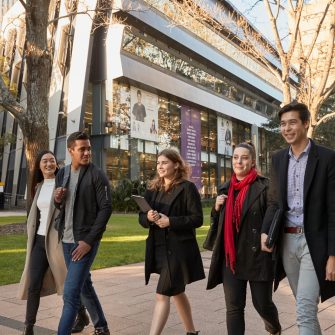Bachelor of Criminology & Criminal Justice/Psychological Science
- Commencing Terms
- Term 1 & 3
- Duration
- 4 years F/T
- Delivery Mode
- Face-to-face (includes blended)
- Campus
-
Kensington
- Codes
- UAC code 422370
- Program code 3799
- CRICOS code 116901K
-
ATAR/2025 lowest selection rank
- 83.0 View all admission criteria
-
2026 Indicative first year full fee
- $16,000*
-
2026 Indicative full fee to complete degree
- $63,000*
-
2026 Indicative first year full fee
- $49,500*
-
2026 Indicative full fee to complete degree
- $216,500*
Application closures for 2026
Undergraduate programs for 2026 intakes are closed for New Overseas Student Commencement (NOSC) applications. Applications for postgraduate programs remain open. Find out if this closure applies to you.
- Overview
- Entry requirements
- What will I study?
- Future careers
- How to apply
- Fees & Scholarships
Overview
Develop a deep understanding of human behaviour and the criminal justice system when you combine two highly-regarded degrees. The Bachelor of Criminology & Criminal Justice/Psychological Science at UNSW equips you with the interdisciplinary knowledge and skills to pursue a wide range of career opportunities in psychology, criminology and beyond.
Psychology delves into the scientific study of behaviour and its underlying mental and neural processes. In the Bachelor of Psychological Science, you'll explore developmental, social, cognitive, biological, physiological and abnormal psychology. You'll also develop strong research methods and data analysis skills.
The Bachelor of Criminology & Criminal Justice (BCCJ) at UNSW provides a comprehensive understanding of crime, social control and the legal system. You'll investigate current social issues like victimisation, juvenile justice, drug-related harm and community safety, while gaining applied social research and policy skills to translate knowledge into practice.
By combining Psychological Science and Criminology, you'll be prepared to make meaningful contributions across diverse sectors, from mental health and organisational psychology to roles within the criminal justice system.
Key features
Integrate two dynamic fields of study
This double degree allows you to combine the scientific study of psychology with the applied practice of criminology and criminal justice. You’ll gain a comprehensive education in core psychology disciplines, while exploring critical criminological issues. This not only opens up a range of purposeful career possibilities, but primes you to make a positive impact in the communities and workplaces you’re a part of.
Tailor your studies to your interests
This degree offers flexibility to pursue a range of specialist electives. In psychology, you can explore areas such as psychology and law, health psychology, cognitive science, and more. In criminology, you’ll tackle present-day social problems and gain applied social research and policy skills.
APAC-accredited psychology program
This program allows students to complete an APAC-accredited undergraduate sequence in psychology. Upon completion of this program, students may choose to complete an additional fourth-year program in psychology (Honours), subject to satisfying the entry requirements.
Why study at UNSW?
Study at two distinguished faculties
Gain your Bachelor of Criminology and Criminal Justice at a law faculty that is ranked #1 in Australia and #12 globally for law and legal studies (QS World University Rankings by Subject, 2025). Our program is ranked #1 in New South Wales for criminology (Excellence in Research for Australia Report, 2018). This double degree also allows you to be part of UNSW Science, one of Australia’s leading science faculties that is ranked #2 in Australia and =#32 globally for psychology (QS World University Rankings by Subject, 2025).
Gain industry experience while you study
Bridge the gap between study and employment through internship and work placement opportunities. In both degrees, you’ll have the option to gain first-hand experience in the field, working under the guidance of experienced professionals.
Join Australia’s most employable graduates
Our students have been recognised as the most employable students for six years in a row (Australian Financial Review (AFR) Top100 Future Leaders Awards, 2020–2025) thanks to our industry-aligned courses, hands-on approach to learning and leading academics create job-ready graduates who can confidently enter the workforce. Our graduates earn the highest median salaries among graduates of Go8 universities (QILT Graduate Outcomes Survey, 2023). You’ll be well positioned to thrive after uni.
Want to see more from UNSW Law and Justice?
Entry requirements
-
- The 2025 Lowest Selection Rank (LSR) is the adjusted rank (ATAR plus adjustment factors) you would have needed to gain entry to this degree in 2025.
- The 2025 A levels score is based on four Advanced Level (A2) subjects. Entry scores are calculated from the best three or four A2 subjects (excluding repeated subjects) using the following values: A*=6, A=5, B=4, C=3, D=2, E=1. At most one Applied A Level subject may be included in the best four subjects used to calculate the aggregate.
- The 2025 IB Diploma is an indication of the IB you would have needed to gain entry to this degree in 2025. It is to be used as a guide only.
- The 2025 Lowest ATAR is the lowest ATAR (before adjustment factors were applied) to which an offer was made. Where <5 is listed, this indicates that less than 5 ATAR-based offers were made and so the score has not been published. N/A indicates no offers were made on the basis of ATAR.
*The Lowest ATAR to which an offer was made, for this program, is based on a UNSW Gateway Early Conditional Offer.
-
At UNSW, we are committed to ensuring prospective students have all the information they need in order to make informed decisions about their study options.
To assist you in gaining a better understanding of how Admissions works at UNSW, we have provided you with a summary of ATAR offers and the student profile.
We hope this information will help you identify the degree that is right for you.
Assumed knowledge
None
Adjustment Factors
We offer a range of adjustment factor schemes that reward students for academic performance and extra-curricular achievements. These schemes also take into account a range of personal and educational disadvantages that may have affected your studies.
HSC Plus
This scheme rewards students who perform well in Year 12 subjects that are relevant to their preferred UNSW degree. You may be awarded up to five points.
Elite Athletes, Performers and Leaders (EAPL)
This program recognises achievements in the areas of sport, academia, leadership and music at an elite level. You may be eligible for up to five points.
Educational Access Scheme (EAS)
Factors such as illness, financial hardship, language difficulties or attending a particular school can mean you don't always get the best possible marks in Years 11 and 12. If one of these situations applies to you, submit an application for the Educational Access Scheme (EAS) via UAC. Eligible students can receive between 1 and 10 points towards their chosen UNSW degree.
Admission pathways
Your ATAR is not the only measure of your potential to succeed, which is why we offer a range of pathways into university. Explore your options below and get in touch with our Future Student Advisers to discuss your path to UNSW.
Gateway Admission Pathway
This scheme is open to students who attend Gateway schools, live in a low-socioeconomic area based on IRSAD and IEO indexes of SEIFA criteria, or are an Aboriginal and Torres Strait Islander person. It adjusts the ATAR requirements for your preferred UNSW degree and provides early offers and early conditional offers to UNSW.
Entry programs for Australian Aboriginal and Torres Strait Islander people
We offer entry programs for Indigenous Australians, including the Indigenous Preparatory Programs and the Indigenous Admission Scheme (IAS). The entry pathway program you apply for will depend on the degree you want to study.
TAFE Admission Pathways
If you’ve completed a qualification under a relevant TAFE Training Package, you can receive credit transfer for up to 48 units of credit (UOC) into the Bachelor of Criminology & Criminal Justice. Please see here for the Bachelor of Criminology & Criminal Justice study plan.
English language requirements
You may be asked to provide evidence of your English proficiency to study at UNSW depending on your educational background and citizenship. English language skills are vitally important for coping with lectures, tutorials, assignments and examinations - this is why UNSW requires a minimum English language competency for enrolment.
If you’re completing an Australian Year 12 qualification (e.g. NSW HSC or equivalent), you do not need to provide anything extra to prove your proficiency. Your qualification will be used as evidence of your English proficiency.
If you do need to provide evidence of your English proficiency, this will be indicated in your application. You can prove this by providing evidence that you meet one or more of the following criteria:
- English language tests and university English courses
- Prior study in the medium of English
- Other qualifications
If you need to improve your English skills before you start your degree, UNSW College’s Academic English Programs are for you. The programs are suitable for various English levels and help you prepare for university studies and life in Australia.
For more details, visit the English Language Requirements page.
International direct entry
Information for applicants with CBSE, HKDSE or Singapore A Levels Qualification
Calculating your CBSE Score:
Awarded by CBSE, average percentage marks across English or Hindi, and your best four remaining subjects. Where marks are given as a range, the mid-point for that range is used e.g. 75 to 80 = 77.5.
Calculating your HKDSE Score:
Entry requirements are based on the aggregate of the best 5 achieved category A subjects (category B and C subjects are not considered).
For subjects other than Citizenship and Social Development: level 5**=7 points, level 5*=6 points, level 5=5 points, level 4=4 points, level 3=3 points, level 2=2 points, level 1=1 point, Level U=0 point.
For subject Citizenship and Social Development: Attained=2 points, Unattained=0 point. Citizenship and Social Development will only be counted towards the aggregate if the 2 points awarded for Attained ranks among the student’s best five scoring subjects.
If Mathematics Compulsory Part and Extended Part (Module 1 or 2) are both presented, both scores can be counted.
Calculating your Singapore A Levels:
Due to significant changes to the GCE A-Level Curriculum and University Admissions Score (UAS) calculation effective 2026, UNSW assessment is currently under review.
Note: Entry requirements published on this page are correct as of the day of publication and may change without notice.
We do not accept secondary qualifications from this country. We may accept tertiary study results, please contact us for more information.
Please contact us for direct entry requirements.
Admission pathways
If you do not meet the requirements for direct entry into your chosen degree, you may be eligible for a pathway program with UNSW College. UNSW College provides alternative entry options using university-approved content so that you can start your UNSW journey with confidence.
English language requirements
You may be asked to provide evidence of your English proficiency to study at UNSW depending on whether you are from an English-speaking background or non-English speaking background. English language skills are vitally important for coping with lectures, tutorials, assignments and examinations - this is why UNSW requires a minimum English language competency for enrolment.
If English is not your first language, you’ll need to provide proof of your English proficiency before you can be given an offer to study at UNSW. You can do this by providing evidence that you meet one or more of the following criteria:
- English language tests and university English courses
- Prior study in the medium of English
- Other qualifications
If you need to improve your English skills before you start your degree, UNSW College’s Academic English Programs are for you. The programs are suitable for various English levels and help you prepare for university studies and life in Australia.
For more details, visit the English Language Requirements page.
Check the specific English language requirements for this program
What will I study?
UNSW is introducing a new academic calendar from 2028.
We are moving to a new flex-semester calendar. What does this mean for your studies?
Program structure
This double degree allows students to combine two fields of interest and graduate with two highly-regarded qualifications. The program is designed to be studied full-time over the course of 4 years, through a combination of face-to-face and independent online learning.
Students will learn from leading academics in lecture and classroom-style environments, with the opportunity to gain practical experience through internship and work placement electives.
Full program structure
This program contains a total of 192 units of credit (UOC) and can be completed in 4 years with full-time study (part-time options available). Students must complete:
-
7 Criminology & Criminal Justice core courses – 42 UOC
- Criminology: An Introduction
- Introduction to Criminal Justice
- Criminal Law and Justice 1
- Criminal Law and Justice 2
- Explaining Crime
- Criminology in Practice
- Imagining a More Just Future
6 Social Science core courses – 36 UOC
- Policy and Society
- Social Research and Society
- Qualitative Social Research
- Quantitative Social Research
- Policy Analysis
- Decolonising Methods for Criminal Justice
At least 3 prescribed electives – 18 UOC
- Crime and Punishment in Historical Perspective
- Crime Prevention Policy
- Crime, Politics and the Media
- Criminology Aspects of Cyber Security
- Criminology Work Integrated Learning Placement
- Criminology, Climate Change and the Environment
- Criminological Aspects of Cyber Security
- Cybercrime and Technology-Facilitated Harms
- Disability in the Criminal Justice System
- Explaining Punishment
- Indigenous Perspective in Criminal Justice
- Issues in Drug Policy
- Issues in Policing
- Power and Powerlessness
- Public Health and Corrections
- Restorative Justice
- State Crime and Human Rights
- The Criminal Trial
- Violence and Victimisation
- Young People and Juvenile Justice
-
10 core courses – 60 UOC
- Psychology A
- Psychology B
- Measuring Mind and Behaviour
- Research Methods 2
- Social and Developmental Psychology
- Perception and Cognition
- Learning and Physiological Psychology
- Assessment, Personality and Psychopathology
- Research Methods 3
- Research and Applications of Psychology
3 prescribed electives – 18 UOC
Students must choose at least 1 of the following:
- Physiological Psychology
- Clinical and Cognitive Neuroscience
- Cognitive Science
- Vision and Brain
- Psychobiology of Memory
- Psychology Research Internship
- Multivariate Data Analysis for Psychology
Students must choose at least 1 of the following:
- Social Psychology
- Psychology and Law
- Health Psychology
- Developmental Psychology
- Psychology Research Internship
- Multivariate Data Analysis for Psychology
3 free electives – 18 UOC
- Any course
Future careers
By studying Criminology and Psychological Science in combination, you’ll have access to diverse and rewarding career paths. You’ll find opportunities in clinical and counselling psychology, criminal justice, forensic psychology, policy development, academic and health research, community safety, correctional services and more. Your interdisciplinary training will also open doors to roles in educational settings, rehabilitation, vocational guidance, and organisational consultancy.
Potential careers
- Case Manager
- Child Protection Officer
- Community Corrections Officer
- Crime Analyst
- Criminologist
- Detective*
- Forensic Psychologist*
- Forensic Scientist
- Intelligence Analyst
- Juvenile Justice Officer
- Parole Officer
- Police Officer*
- Policy Advisor
- Private Investigator
- Probation Officer
- Registered Psychologist*
- Rehabilitation Counsellor
- Research Analyst
- Victim Support Officer
*Additional qualifications and training required
How to apply
Applications for undergraduate study from domestic students (Australian citizens, Australian permanent residents, Australian permanent humanitarian visa holders and New Zealand citizens) are processed by the Universities Admissions Centre (UAC).
Visit the Apply section of the UAC website and you can nominate up to five degrees in order of preference, with the first being your most desired degree and university.
On-time applications for admission usually close at the end of September each year for Term 1 admission. Late applications can be submitted, but a late fee will apply. For study starting in Term 1, the majority of offers are made in December and January. Visit the UAC website for key dates for admission outside of Term 1.
Ready to start your application?
For most international students, applications are submitted via our Apply Online service. We encourage you to submit your completed application as early as possible to ensure it will be processed in time for your preferred term.
Some high-demand programs with limited places, may have an earlier application deadline or may have an earlier commencement date. For details, visit the international admissions information page.
*If you are an international student studying an Australian qualification, go to the Universities Admission Centre (UAC) for application and UAC key dates. Note: If you are under 18 years of age, you need to make special arrangements. For details, visit the under 18 international students page.
Ready to start your application?
Fees & Scholarships
Commonwealth Supported Place: Student Contribution Band 4
*The student contribution for a Commonwealth Supported Place is an indication only of the amount payable in Year 1 based on a standard full-time load of 48 credit points (1.0 EFTSL). The actual student contribution you will be liable for depends on your individual program of study and the calendar year in which you enrol. Actual fees are calculated upon enrolment. Student contribution amounts are subject to annual review by the university and may increase each year during your studies (subject to caps determined by the Australian Government), effective at the start of each calendar year.
The indicative fees listed here are based on an estimated average and are for tuition only - other fees and charges are not included.
*Fees are subject to annual review by the University and may increase annually, with the new fees effective from the start of each calendar year. The indicative fees listed here are based on an estimated average and are for tuition only, other fees and charges are not included. The amount you pay will vary depending on the calendar year to enrol, the courses you select and whether your study load is more or less than 1 Equivalent Full Time Student Load (8 courses per year).
Indicative fees are a guide for comparison only based on current conditions and available data. You should not rely on indicative fees. More information on fees can be found at the UNSW fees website.
Indicative fees to complete the program have been calculated based on a percentage increase for every year of the program. Fee increases are assessed annually and may exceed the indicative figures listed here.
Indicative fees to complete the program include tuition plus an estimate of study-related costs of approximately $1,000 per year. To find out more about other costs, visit UNSW International.
Scholarships
At UNSW, we award over $83 million in scholarships each year. We pride ourselves on rewarding excellence and making university accessible to students from all walks of life. Whether you’re a domestic or international student, our range of scholarships, prizes and awards can support your journey.
Progress starts here – at a world-leading university

Top 20 Worldwide
Ranked in the global top 20 for three consecutive years
QS World University Rankings, 2024–2026

Winner of the AFR Most Employable University Award six years in a row
AFR Top100 Future Leaders Awards, 2020–2025

Australia's #1 for Innovation
Highest number of startups and spinouts from university-developed tech
SCOPR report, 2024




